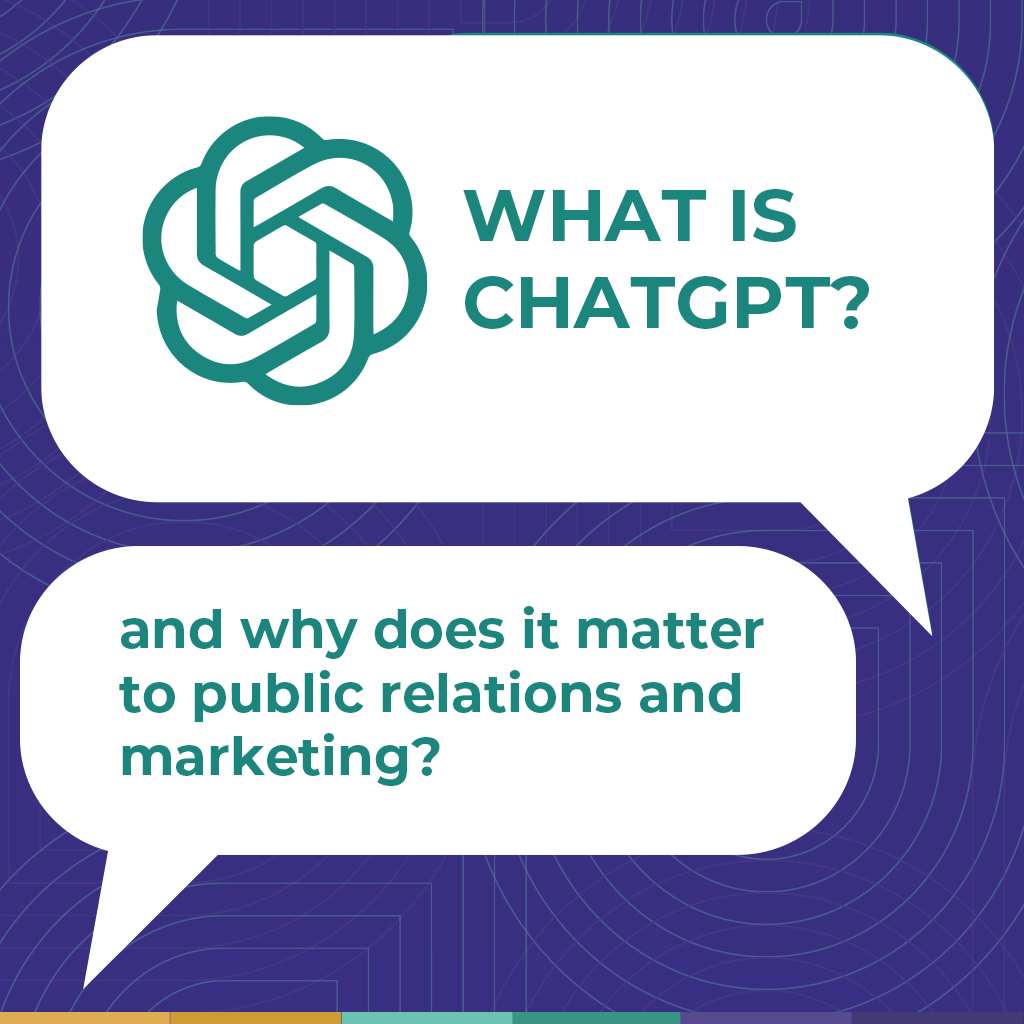What is ChatGPT and why does it matter to public relations and marketing?
by Leslie Richards
ChatGPT (Conversational Generative Pre-trained Transformer) is an application developed by OpenAI that is capable of generating human-like text. It is one of many such tools that have exploded onto the scene, and it is transforming everything from the way we write and teach, to the way we accomplish technical tasks. Conversational, generative chat apps, like ChatGPT, are considered “large language models” which are trained on massive datasets of online content.
Google describes a large language model, or LLM as “a deep learning algorithm that can recognize, summarize, translate, predict and generate text and other content based on knowledge gained from massive datasets.”
These tools generate original text in response to a user’s question or direction. AI chat can deliver content in a wide range of styles and formats, including fully developed narratives, social media posts, blog articles, survey questions, and even poetry and computer code.
This is the beginning of a sea change.
ChatGPT is able to understand and respond to human language using “natural language processing”, making it possible to interact with the application to further refine each piece of content it delivers.
- It can generate text that is similar to content generated by humans: ChatGPT is able to generate text that is difficult to distinguish from text written by humans. It is sensitive to stylistic variations and nuanced content. This makes it ideal for generating marketing pieces tailored to particular audiences, as well as routine business correspondence. Do you need to write a resignation letter that is gracious and grammatically perfect? Chat GPT will generate one in a matter of seconds. Do you need to rework your email campaign to target a 30-something audience in California vs. a 60-year-old audience in Kansas City? ChatGPT can do this as well.
- It can be fine-tuned for specific tasks: ChatGPT can be fine-tuned for specific tasks, such as answering questions, creating song lyrics, writing college essays, drafting mission statements, headlines or website copy.
- It can be integrated with other AI technologies: ChatGPT can be integrated with other AI technologies such as speech recognition software, to create more sophisticated and interactive applications. We should expect all kinds of systems to be impacted by automated sequences informed by this technology. Manufacturing, finance, law, logistics, and marketing all readily come to mind. In fact, it is hard to think of many industries that will not be impacted. In healthcare, for example, large language models are being used to analyzing patients’ medical records to make more accurate and reliable diagnoses and will ultimately improve patient outcomes and reduce the time to accurate diagnoses.
What is the impact of generative chat on PR and marketing?
ChatGPT and similar tools will change the way content is generated and the way we interact with information and the written word. This will have an impact on every knowledge worker, but particularly those in communication fields.
Know your Industry.
Chat GPT and its ilk are rapidly evolving, but there are limitations. In very niche fields, particularly nuanced fields with specific knowledge bases such as technology, scientific research, and law, Chat GPT is still learning, and it may produce errors. Because Chat GPT is building on existing online content it often is less accurate on current events or emerging topics. Marketers who specialize in a particular industry, particularly in the B2B sector, will continue to have an important role in refining the results of generative chat. Generalists may have a harder time adding value to AI-generated content. This is a time to go deep, rather than wide.
Marketers and communication consultants will be valued more for their strategic counsel and their ability to understand data than for the execution of routine writing tasks.
Focus on the audience and the narrative more than ever.
With the advent of AI writing tools it’s easier than ever to generate large amounts of content quickly and at a low cost. However, the challenge is – as it has always been – to create content that is relevant, engaging, and resonates with the target audience. In this context, focusing on the audience and the narrative is crucial. Adding small details that make your content more authentic and personal will help set it apart from AI-generated content.
Human-centered formats may become more important.
When trying to establish thought leadership in a specific area, new content formats such as video interviews, podcasts, panel discussions, and social media live-streams offer formats that feature human interaction and dialog – something that AI generated written content cannot do.
Be careful when using AI generated content for SEO and content marketing.
Writing is time consuming. For content marketers and SEO specialists, getting enough content to move the needle in search results has always been challenging. Is AI generated text answer to your SEO prayers? Yes and no. Google and others are investing significant resources in software that can detect AI content. A recent article in SEOai provides a good summary of the way in which software detects AI generated content. If your marketing team is using unedited AI content for search engine purposes, it is quite possible that your site will be penalized for this at some point in the future. AI content may be useful in providing a rough draft, but make sure it is heavily edited.

Here’s what we can expect.
While it’s difficult to predict exactly how marketing jobs will change based on today’s AI, there are some changes we imagine to be right around the corner. Here are a few:
- Automation of repetitive tasks: AI-powered tools can automate repetitive tasks such as data analysis, customer segmentation, and content creation, freeing up marketers to focus on more strategic and creative tasks.
- More data-driven decision-making: AI can help to analyze large amounts of data and identify patterns and insights that would be difficult for humans to spot. This can help marketers to make more informed decisions about target audiences, messaging, and campaigns.
- Personalization at scale: AI-powered tools can help to personalize marketing messages and experiences for individual customers at scale, making it possible to deliver highly relevant and effective communications.
- Better measurement and ROI analysis: AI can help to measure and analyze the performance of marketing and public relations in real-time, allowing marketers to adjust and optimize results.
- New career paths: As AI takes over some of the current tasks of marketing, new career opportunities may emerge, such as AI-strategist, and AI developers for marketing, who will be responsible for developing, implementing, and managing AI-based marketing strategies. Certainly data analysts will have even more of a role than they do today.
How AI supports better measurement and ROI analysis.
AI can support better measurement and ROI analysis by providing insights and predictions that are difficult or impossible for humans to make on their own. Here are a few ways that AI will be a game-changer:
- Predictive modeling: AI can be used to create predictive models that can forecast the outcome of marketing campaigns, such as the likelihood of a customer purchasing a product or the expected return on investment.
- Real-time data analysis: AI-powered tools can analyze data in real-time and more quickly than humans, which allows marketers to adjust campaigns and optimize performance on the fly.
- Identify patterns and trends: AI can help to identify patterns and trends in large datasets that would be difficult for humans to spot. This can help marketers to understand customer behavior and preferences and make data-driven decisions.
- Optimization: AI-powered tools can help to optimize campaigns by identifying the most effective messaging, targeting, and channels. The ability for tools like Chat GPT to integrate with other marketing automation systems and generate or edit content on the fly, in response to real-time data, cannot be far off. Microsoft has recently announced the integration of ChatGPT (of which it is a partial owner) with the Teams platform.
- Attribution: AI can help to attribute conversions and revenue to different marketing channels and campaigns, which allows for more accurate measurement of ROI.
As with many big industry shifts, there is good news and bad news. It is not unreasonable to assume that jobs and livelihoods will be impacted. There will also be new opportunities. Routine tasks will be automated leaving time for more strategic thinking and a deeper understanding of subjects and audiences. Position yourself strategically and buckle in, the change is here.


